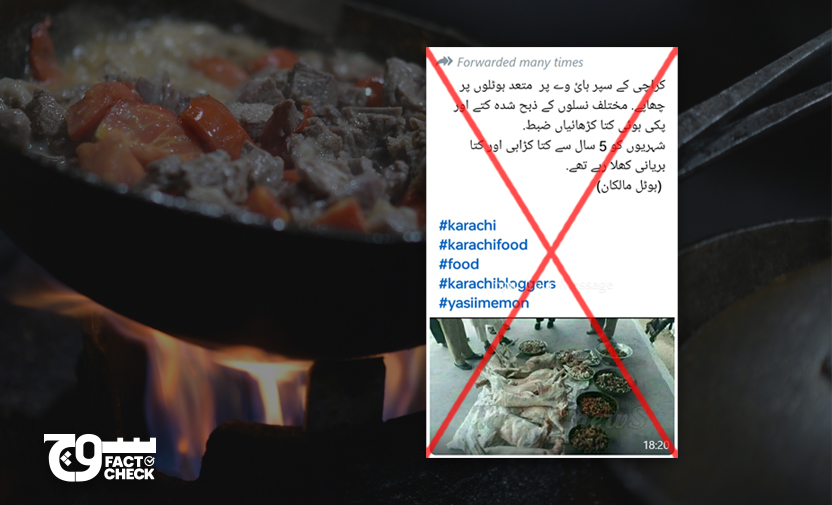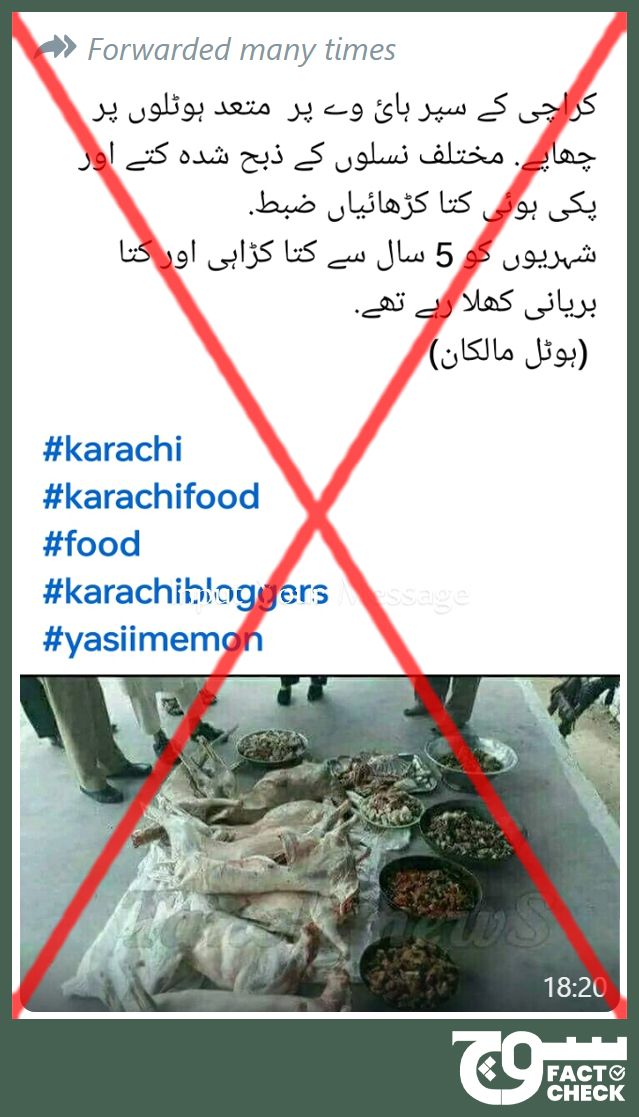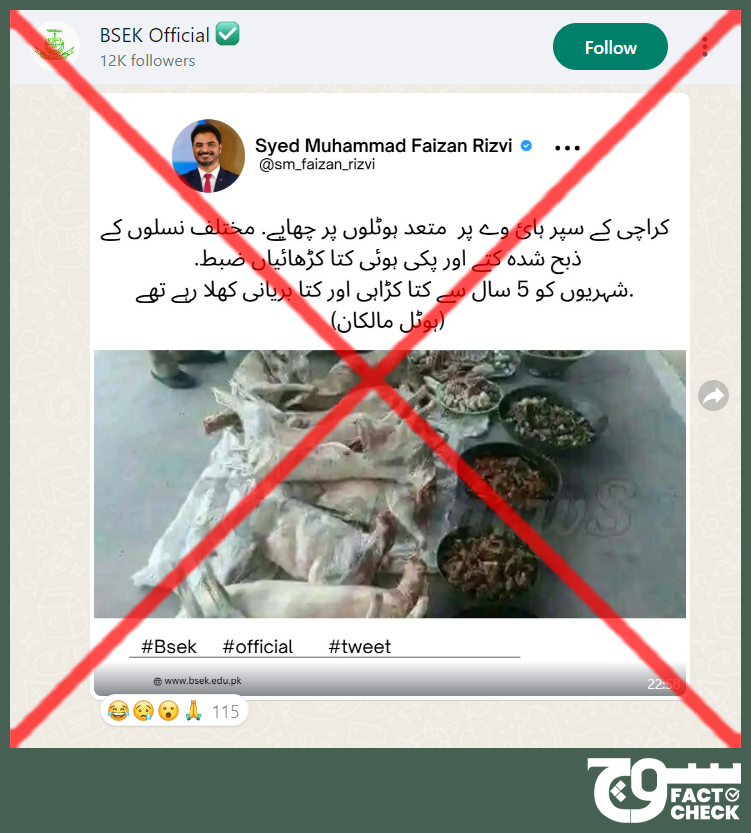
Claim: Authorities have recovered slaughtered dogs and food made with dog meat from restaurants in Karachi.
Fact: The claim is false as the Sindh Food Authority (SFA) has refuted the reports. The accompanying pictures are also old and unrelated.
On 9 September 2024, Soch Fact Check received a WhatsApp message containing the screenshot of a social media post, alleging that bodies of slaughtered dogs and cooked karahis — a traditional dish in Pakistani cuisine — made with dog meat were recovered during raids conducted at multiple restaurants located at the Superhighway, or the M-9 motorway, which connects Karachi and Hyderabad.
The screenshot in the social media post included an image of the dog meat that was recovered during the raids. The text also claimed that restaurant owners confessed to serving karahis and biryanis — a popular mixed rice dish in South Asia — made with dog meat to patrons. In full, it reads as follows:
“کراچی کے سپر ہائی وے پر متعد ہوٹلوں پر چھاپے مختلف نسلوں کے ذبح شدہ کتے اور پکی ہوئی کتا کڑھائیاں ضبط شہریوں کو 5 سال سے کتا کڑاہی اور کتا بریانی کھلا رہے تھے. ہوٹل مالکان
[Raids on multiple hotels on Karachi’s Super Highway; slaughtered dogs of different breeds and cooked dog karahis seized; citizens were being fed dog karahi and dog biryani for [the past] five years, [say] hotel owners]”

Pictures of the authorities conducting raids and recovering dog meat from hotels are also being linked to other regions and cities, including the Khyber Pakhtunkhwa (KP) province and its capital, Peshawar; these can be seen here, here, here, and here.
Fact or Fiction?
Soch Fact Check reached out to an official of the Sindh Food Authority (SFA), who refuted the claim and directed us to a clarification posted on the regulatory body’s social media.
The reports of dog meat, as well as meat of dead animals, being recovered are “baseless”, according to the statement issued by an SFA spokesperson. “The conspiracy to harm the food industry by attributing fake news to the Sindh Food Authority is sad,” they said, adding that the body “will write to relevant institutions to take action against those who spread false and baseless news”.
Regarding the claim being linked to KP and Peshawar, the Khyber Pakhtunkhwa Food Safety & Halaal Food Authority (FS&HFA) said in a 4 September 2024 post that it “conducted a thorough investigation” and that “no haram [Islamically forbidden], dog or donkey meat has been found in any hotel” in the province.
“Therefore, people can comfortably eat in any hotel in Khyber Pakhtunkhwa,” it added.
In another post made on its Facebook page on 5 September, the body’s Communication Wing quoted its director-general, Wasif Saeed, as saying the reports circulating on social media were “fabricated and baseless”.
“No dog meat or karahi was ever recovered from any hotel restaurant in Khyber Pakhtunkhwa. The public is requested not to listen to such rumours,” Saeed was quoted as saying.
As for the viral pictures attached in the claim, we observed that a logo on the bottom right has the words “کوھاٹ [Kohat]” in Urdu and “Beautiful Kohat” in English. When we searched for Facebook pages, we came across one, which has the same name and logo and had posted the images on 2 August 2017.
The accompanying caption reads:
“اسسٹنٹ کمشنر کوھاٹ گل بانو کا ناغہ کے روز گوشت فروخت کرنے پر سپین غر ھوٹل ہنگو پھاٹک کو ایک لاکھ جرمانہ المدینہ ھوٹل کو 20ہزار قالو ھوٹل کو 20 ہزار اور ناجائز تجاوزات کے خلاف کریک ڈاون ایک دن میں 2لاکھ 50ہزارروپے جرمانہ خزانہ سرکار میں جمع کروادیا۔
[Kohat Assistant Commissioner Gul Bano imposed a PKR 100,000 fine on Spin Ghar Hotel, Hangu Phaatak, PKR 20,000 on Al Madina Hotel, and PKR 20,000 to Qaloo Hotel for selling meat on a meatless day. [She also] deposited fines worth PKR 250,000 in the state treasury in one day following a crackdown against illegal encroachments.]”
The aforementioned post makes no mention of slaughtered dogs being recovered or that restaurants were serving dog meat to patrons.
In the viral posts currently doing the rounds, two other images — one showing a police officer pouring food from one wok to another and another depicting a cop holding the carcass of a small animal — are also from the same post about the 2017 inspection by Bano, who now holds two posts in the Government of Khyber Pakhtunkhwa: Director (Shared Services Unit) and Additional Secretary (Financial Reforms).
A fourth visual, which shows a plate of rice and meat, appeared in a 2 April 2018 post on X (formerly Twitter) here, where it was attached to the claim that dog and donkey meat were found being used in Jeddah, Saudi Arabia. The food shown appears to be Mandi or Kabsa, both Arab dishes. While we have not independently verified the photo’s connection to the Kingdom, seeing that a picture from 2018 was used to claim that the incident took place recently, raises further questions about the legitimacy of these posts.
We traced back the fifth picture, which depicts hanging carcasses, to a 2012 Change.org petition related to dog slaughter in Vietnam.
A sixth photo shows numerous dogs gathered in a caged compound of sorts. A reverse-image search led us to this 25 March 2015 post on a WordPress blog about animal hoarding, which provides the source as a page on Care2, a website to connect activists “with other individuals, organizations and responsible businesses”.
The Care2 page appears to have been taken down now but we found it archived on 7 December 2012 on the Internet Archive’s Wayback Machine.
Reverse-searching the clearer version of the picture allowed us to find it on Shutterstock and iStock where the captions stated that on 13 August 2011, Thai police rescued over 1,000 dogs who were to be sent to Vietnamese slaughterhouses.
This is not the first time a claim of this sort has surfaced on social media. In 2023, we debunked a similar claim linked to the KP province. At that time, we came across a 2019 Facebook post, which connected the pictures to Peshawar and accompanied it with a news clipping that included a photo of a skinned dog.
However, that image was also not from Pakistan since we found it in reports from 2015 by multiple Iranian websites such as Fars News Agency, Mashregh News, and Bourse News. These outlets investigated and debunked the claim, along with the clarification that while it did occur, the incident was two years old. The reports also quoted an official named Saeed Kafi as saying the individual — “who killed animals on the outskirts of the city and sold their meat in restaurants” — was arrested.
Virality
Soch Fact Check found the claim shared here, here, here, here, here, and here. A reel on the same platform received over 2.3 million plays.
It was also posted here, here, and here on X, here, here, here, here, and here on Instagram, and here on YouTube.
We also found the claim on pages and accounts connected to the Board of Secondary Education, Karachi (BSEK), though it is unclear if these are official. It was shared on a WhatsApp channel named “BSEK Official ✅” — which has over 12,700 followers — where it gained over 100 reactions.

An individual named Syed Muhammad Faizan Rizvi — who claims to work in the BSEK’s “Examination Department”, according to his social media profiles — propagated the claim here, here, here, and here.
The claim was shared back in 2018, 2019, and 2021 as well.
Conclusion: The Sindh Food Authority and the Khyber Pakhtunkhwa Food Safety & Halaal Food Authority have refuted the reports as “baseless” and “fabricated”. The accompanying pictures are old and unrelated.
Background image in cover photo: Shahrukh Rehman
To appeal against our fact-check, please send an email to appeals@sochfactcheck.com
